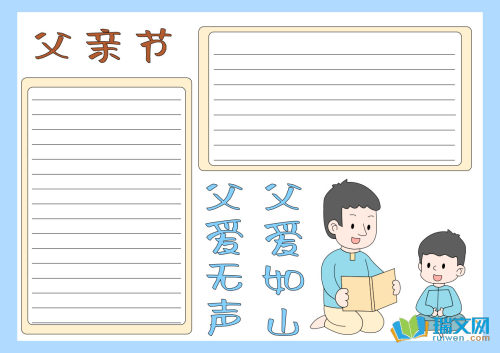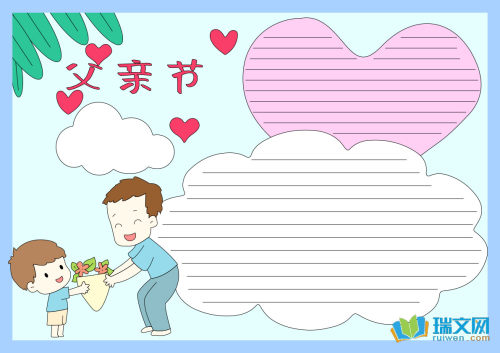父亲节手抄报内容英语
在学习、工作中,大家总免不了要接触或使用手抄报吧,手抄报是传递信息,宣传知识的有效工具。你知道什么样的手抄报才具有教育意义吗?下面是小编精心整理的父亲节手抄报内容英语,希望对大家有所帮助。
父亲节手抄报内容英语





父亲是一个蜡烛,悄悄的为你点燃;父亲是一名园丁,默默的为你修剪;父亲是一名老师,耐心的为你讲解。
1. Wish beloved father good health, great happiness and good luck in everything on the coming Fathers Day!
在父亲节来临之际,祝愿敬爱的父亲身体健康,节日快乐,万事如意!
2. With warm wishes for Fathers Day!
时值父亲节,致以最真挚的祝福!
3. Happy Fathers Day to you!
祝您父亲节快乐!
4. The lucky star shines bright!
吉星高照!
5. Congratulate you on Fathers Day!
恭贺父亲节!
6. Wish you a happy Fathers Day and the best of everything!
祝您父亲节快乐!万事如意!
7. I hope you know how proud I am of you, father. Happy Fathers Day! Happiness always!
爸爸,我希望您能知道我是多么为您感到自豪啊,祝您父亲节快乐,永远快乐!
8. May all your wishes come true!
愿您美梦成真!
9. Happy Fathers Day to you and good luck in everything!
祝您父亲节快乐、万事如意!
10. I hope everything goes well.
希望您诸事顺利。
11. May happiness in countless ways fill every moment of your holiday.
愿数不尽的欢乐陪伴您佳节的每时每刻。
12. Happy Fathers Day to you, my dear father! Thank you for everything youve done for me!
父亲节快乐,亲爱的爸爸!谢谢您为我所做的一切!
13. appy Fathers Day to an extraordinary father!I love you so much!
祝我独一无二的老爸父亲节快乐,我非常爱您!
14. HAVE THE BEST FATHER S DAY EVER.
祝您有个最棒的父亲节。
15. Have the best Father’s Day ever.
祝您有个最棒的父亲节。
父亲节手抄报作文:
The first fathers day was in June, 5th, 1910, United Stated. In 1909, a lady called Bruce Dodd put forward that people should establish father’s day. At that time, people only celebrated the mothers day, but nobody celebrate fathers day yet. Lady Dodd had lost her mother when she was very young, her father raised her grew up. Lady Dodd was so thankful for what her father had done for her that she wrote a letter to the government. In the letter, she appeals to establish the fathers day. The government accepted her suggestion and decided that the third Sunday of June is the national father’s day. In 1972, the president Nixon had passed the law and agreed that the father’s day is on June the third Sunday. From this year, the world started to celebrate father’s day.
第一个父亲节始于1910年6月5日。在这一年,一位叫布鲁斯.多德的女士提出人们应该成立父亲节。在那个时候,人们仅仅庆祝母亲节,却没人庆祝父亲节。而多德女士在很小的时候就失去了自己的母亲,由自己父亲亲手带大。她非常感谢自己父亲所做的一切,于是,她给政府写了一封信,提议成立父亲节。政府同意了她的请求,并决定把每年的6月第三个星期天定为全国父亲节。在1972年,总统尼克松通过了父亲节的法律并同意把每年6月的第三个星期日定为父亲节。从这一年开始,世界开始庆祝父亲节。
On this special day, the children usually dedicate flowers to their fathers. The red roses to those who still alive, while the white ones to the fallings. Fathers always are considered being the central of the whole family. Without father in the family, home may feel insecure. The father always fights for the family and support the family. On this day, we can do something for our fathers. For instance, we can make a breakfast for them, or buy them a nice tie. We should spend more time with our father, show our love to them.
在这特别的一天,孩子们通常会给父亲送花。红玫瑰送给依然健在的父亲,白玫瑰送给已逝的父亲。父亲一直被认为是家庭的顶梁柱。没有父亲在的家庭,就缺乏安全感。父亲总是为了养家奋斗奔波。在这一天,我们可以为自己的父亲做些什么。比如,为父亲做一份早餐;为他们买条领带。我们可以花更多的时间陪伴自己的父亲,让他知道我们爱他。
The father’s day is coming, take this chance, and tell our fathers that we love him. Happy father’s day!
父亲节就要来了,抓住这次机会,告诉父亲,我爱他。父亲节快乐!
父亲节日记:
Two years before his death, my father gave me a small suitcase filled with his writings, manuscripts1 and notebooks. Assuming his usual joking, mocking2 air, he told me he wanted me to read them after he was gone, by which he meant after he died.
A week after he came to my office and left me his suitcase, my father came to pay me another visit; as always, he brought me a bar of chocolate (he had forgotten I was 48 years old). As always, we chatted and laughed about life, politics and family gossip3. A moment arrived when my father’s eyes went to the corner where he had left his suitcase and saw that I had moved it. We looked each other in the eye. There followed a pressing silence. I did not tell him that I had opened the suitcase and tried to read its contents, instead I looked away. But he understood. Just as I understood that he had understood. Just as he understood that I had understood that he had understood. But all this understanding only went so far as it can go in a few seconds. Because my father was a happy, easygoing4 man who had faith in himself: he smiled at me the way he always did. And as he left the house, he repeated all the lovely and encouraging things that he always said to me, like a father.
As always, I watched him leave, envying5 his happiness, his carefree and unflappable6 temperament. But I remember that on that day there was also a flash of joy inside me that made me ashamed. It was prompted by the thought that maybe I wasn’tas comfortable in life as he was, maybe I had not led as happy or footloose7 a life as he had, but that I had devoted it to writing —you’ve understood... I was ashamed to be thinking such things at my father’s expense. Of all people, my father, who had never been the source of my pain — who had left me free. All this should remind us that writing and literrature are intimately linked to a lack at the centre of our lives, and to our feelings of happiness and guilt.
But my story has a symmetry8 that immediately reminded me of something else that day, and that brought me an even deeper sense of guilt. Twenty-three years before my father left me his suitcase, and four years after I had decided, aged 22, tobecome a novelist, and, abandoning all else, shut myself up in a room, I finished my first novel, Cevdet Bey and Sons;
with trembling hands I had given my father a typescript of the still unpublished novel, so that he could read it and tell me what he thought. This was not simply because I had confidence in his taste and his intellect: his opinion was very important to me, because he, unlike my mother, had not opposed my wish tobecome a writer. At that point, my father was not with us, but far away. I waited impatiently for his return. When he arrived two weeks later, I ran to open the door. My father said nothing, but he at once threw his arms around me in a way that told me he had liked it very much. For a while, we were plunged9 into the sort of awkward silence that so oftenaccompanies moments of great emotion. Then, when we had calmed down and begun to talk, my father resorted to highly charged and exaggerated language to express his confidence in me or my first novel: he told me that one day I would win the prize that I am here to receive with such great happiness.
He said this not because he was trying to convince me of his good opinion, or to set this prize as a goal; he said it like a Turkish father, giving support to his son, encouraging him by saying, ‘One day you’llbecome a pasha10!’ For years, whenever he saw me, he would encourage me with the same words.
My father died in December of2002.
Today, as I stand before the Swedish Academy and the distinguished11 members who have awarded me this great prize — this great honour — and their distinguished guests, I dearly wish he could be amongst us.
在父亲去世的两年前,他给了我一个小小的手提箱,里面装满了他的作品、手稿和笔记本。他用平常那种搞笑调侃的口吻要我在他走后再看,这个“走”当然说的是他永远走了以后。
在父亲把箱子留到我办公室一个星期后,他又来看我了;和以往一样,他给我买了巧克力(他忘了我都48岁了)。亦如以往,我们笑谈生活、政治和家庭琐事。后来他的目光落到了他曾放箱子的那个角落,发现箱子被我移动过了。我们四目相对,陷入了令人压抑的沉默。我并没有告诉他我打开了箱子,去看里面的内容,而只是把视线移开了。然而他明白了一切。就像我明白他明白了一样。就像他明白我明白他明白了一样。但所有的明白就在几秒钟之内明白了。因为父亲是一个快乐、随和、心怀信念的人——他只是照例冲我笑了笑。当他离开时,没忘记把他作为父亲该说的那一席亲切的鼓励之词又重复了一遍。
我也同往日一样,注视着他的离开,无比羡慕他的快乐,他的无忧无虑和他处世不惊的脾气。然而,那天曾闪现在我心头,令我自愧无比的片刻的窃喜依旧记忆犹新。那是由我的这种感觉引起的——可能我没有过父亲那样舒适惬意的生活,也没有他那如此快乐、无拘无束的'生活,但我献身于写作了——你明白……想到父亲为这一切所付出的代价,我惭愧极了。在所有的人中,父亲从来不曾给我带来痛苦——他完全让我自由发展。所有这些都应该让我们记住写作和文字都与我们生活中心所缺失的东西紧密相联,与我们的幸福感与负疚感息息相关。
我的故事同时也相应地提醒我那天还有让我更加内疚的一件事。在父亲留给我他的手提箱的二十三年前,在我从22岁开始决心成为一名小说家而放弃其它一切,把自己关在房间里写作之后的第四年,我完成了第一部小说《杰夫德贝伊与其子》。我用颤抖的手将未出版书的打印稿拿给父亲看,想听取一点他的读后感言。这并不仅仅是因为我对他的品位和智慧深信不已,他的看法对我如此重要,也是因为他不像母亲那样,反对我成为一名作家。在这一点上,父亲比我们看得更远。我迫不及待的等着他的回答。两个星期之后他来了,我跑过去开门。父亲没有说任何话,只是张开手臂给了我一个拥抱,用这种方式告诉我他非常非常喜欢这部作品。一时之间,我们陷入了那种令人尴尬的沉默中,那种时常伴随着重大情绪或起或落的沉默。后来,等我们平静下来开始说话,他用了一种情感激荡而夸张的语言对我和我的小说表达了他强烈的信心:他告诉我,终将会有一天,我会像在此时此地一样,带着如此巨大的喜悦接受奖项。
他说这话并不是为了试图要我相信他对我的好评,或是把这个奖项作为我的目标;他说这翻话就像一位土耳其父亲那样给予儿子支持,并鼓励我说:“总有一天,你会成为帕夏的!”许多年来,无论何时,他看到我都以同样的话语鼓励我。
2002年12月,父亲永远的走了。
今天,我站在瑞士文学院,站在给予我这无尚光荣奖项的各位尊敬的院士面前,我衷心地希望此刻我的父亲就在我们中间。
【父亲节手抄报内容英语】相关文章:
英语父亲节手抄报内容05-28
英语手抄报父亲节内容05-29
父亲节手抄报英语内容05-28
父亲节英语手抄报内容05-28
2017父亲节手抄报内容英语05-28
英语手抄报的内容06-19
英语手抄报内容05-15
父亲节手抄报内容06-06
父亲节清晰内容手抄报05-28